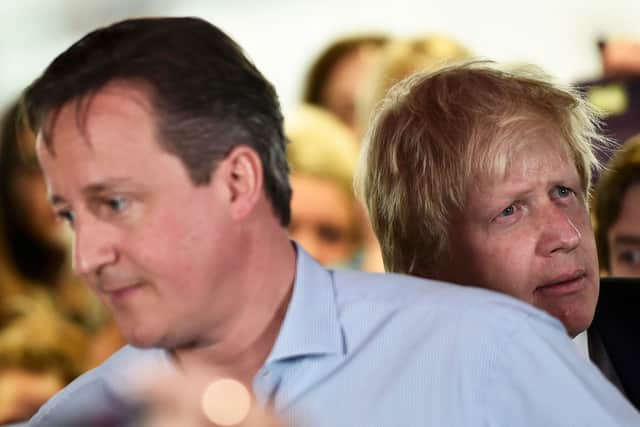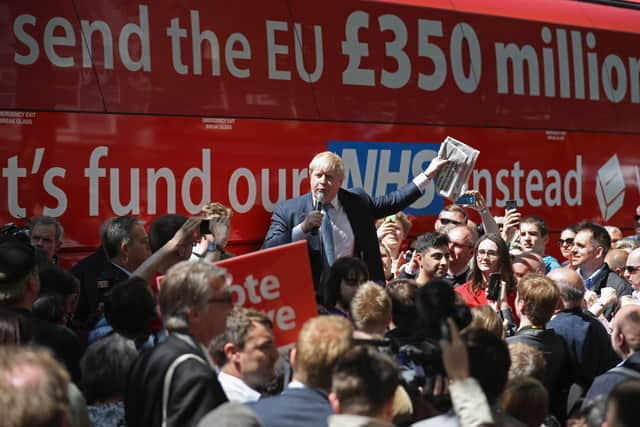Partygate inquiry: the complicated relationship between former PM’s David Cameron and Boris Johnson
People in this article
and live on Freeview channel 276
Former Prime Minister David Cameron has been delivering answers this morning to the Covid inquiry committee regarding the Conservative government’s handling of the pandemic, which has elicited some very choice responses in light of Boris Johnson’s government. He becomes the first politician to give information under oath, as the fallout from the 16 gatherings under Johsnon’s watch during the UK-wide lockdown continues.
Cameron, who stepped down as Prime Minister after losing the Brexit referendum, said that it was a mistake that his government did not look at other pandemics that could take place, despite being in charge during the heyday of SARS and the Swine Flu pandemics, but stopped short of throwing Boris Johnson under the political bus (with how much could be saved voting leave emblazoned on the side) when asked if he thought Johnson’s indiscretions had damaged the Tory party. The former PM opted not to join the political pile on and instead refused to answer the question.
Advertisement
Hide AdAdvertisement
Hide AdIt’s a complex relationship between Boris Johnson and David Cameron, one that draws parallels from their pre-political careers but one that fragmented during campaigns for the EU referendum. They both came from the same dining club that has elicited controversy before, the Bullingdon Club, a prestigious, all-male, and exclusive dining club at the University of Oxford in England. It is known for its wealthy and privileged members, who often come from aristocratic backgrounds or have significant social status.
One of the club's notable traditions is the smashing of glassware, including wine glasses, during their events. This act symbolises the members' ability to cover the financial costs of their actions and highlights their privileged status. Additionally, the club's exclusivity and reputation for excessive behaviour have led to accusations of elitism and a detachment from the realities of ordinary people's lives.
Some have felt that Johnson’s cavalier attitude regarding breaches of the COVID-19 lockdown echo the same level of entitlement one expected from the Bullingdon Club “paying off” restaurants for the damage caused, while Cameron gained notoriety for his time as part of the club for an obscene act he engaged in with a pig's head.


Both are also considered part of the ‘Notting Hill set,’ a group of modernising Tories that champion liberal conservatism and sought to reshape the party's image. During this period, with Cameron as leader of the opposition and Boris Johnson an MP for Henley, the pair forged a friendship and collaborated on various initiatives, including the development of the "compassionate conservatism" agenda that aimed to modernise the party's policies.
Advertisement
Hide AdAdvertisement
Hide AdThe dynamics between the two shifted when David Cameron assumed the role of Prime Minister after toppling Tony Blair and Labour in the 2010 General Election, while Boris Johnson became the Mayor of London in the same year. Initially, their relationship seemed to be one of mutual support, with Cameron appointing Johnson as his campaign co-chair for the 2012 London Olympics. Johnson's charisma and popularity in the capital added a significant boost to Cameron's leadership.
The fracture between David Cameron and Boris Johnson.
However, the moment that strained their relationship was the Brexit referendum in 2016. While Cameron campaigned for the UK to remain in the European Union, Johnson took a different stance, becoming the leading figure for the Leave campaign, following on from his years of being a Eurosceptic while a journalist for The Times and The Telegraph. Their differing opinions on the crucial national issue put them on opposing sides of the debate and led to a fracture in their relationship.
Johnson's decision to support Brexit was seen by many as a betrayal of Cameron's leadership and his pro-EU stance, but Johnson’s popularity was at an all time high while many voted to leave the European Union, it is claimed, as a form of protest vote against Cameron, who vowed to step down as Prime Minister if the referendum voted in favour of leaving the EU. He followed up on his promise, and Cameron leaving office left Johnson as perhaps the most prominent figure within the Conservative Party.
Following the Brexit referendum, tensions between Cameron and Johnson were palpable. Cameron publicly criticised Johnson for his role in the Leave campaign, expressing disappointment in his decision. To Johnson’s credit however (and his political career), the future Prime Minister acknowledged the difficult circumstances surrounding the referendum and praised Cameron's achievements during his tenure.
Advertisement
Hide AdAdvertisement
Hide Ad

In a statement, Boris Johnson said, "I want to begin by paying tribute to David Cameron. David Cameron has achieved some truly remarkable things, not just for the Conservative Party but for the whole country, and I know that everyone will want to join me in thanking him for everything he has done." Johnson highlighted Cameron's efforts in introducing marriage equality, economic reforms, and reducing unemployment, emphasising the positive impact of his leadership.
Despite their differences, there have been occasional moments of reconciliation. Following Johnson's election as Prime Minister in 2019, he paid tribute to Cameron's efforts and acknowledged his contributions to the party.
However, lingering tensions remain, with Cameron's memoir revealing his frustration with Johnson's conduct during the Brexit campaign. Not enough however for Cameron to admit to the committee this morning that Johnson’s litany of rule breaking during the COVID-19 lockdowns have caused irreparable damage to the party he once led.
Comment Guidelines
National World encourages reader discussion on our stories. User feedback, insights and back-and-forth exchanges add a rich layer of context to reporting. Please review our Community Guidelines before commenting.
